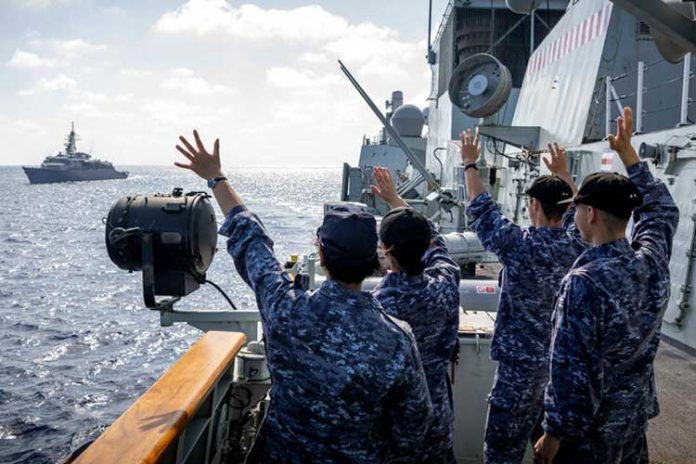Diplomats, military officers, and experts from the European Union and Japan gathered in Tokyo to discuss “Sanctions Enforcement at Sea,” according to an EU official website.
On 21 August, the EU Delegation to Japan and the Embassy of the Federal Republic of Germany in Japan, with the support of the EU Enhancing Security Cooperation In and With Asia (ESIWA) project, hosted a roundtable on sanctions enforcement at sea. The event marked the visit to Tokyo of two German Navy ships: the frigate Baden-Württemberg and the supply ship Frankfurt-am-Main.
Representatives of the Japanese Ministry of Foreign Affairs and Ministry of Defence, the European External Action Service, the EU Naval Force Mediterranean Operation Irini, the German Embassy in Japan, the German Navy, and the French Navy spoke at the roundtable. The meeting brought together a total of about 50 participants from the EU and Japan, including representatives from research centres and the private sector.
PSMX and ECC
The Baden-Württemberg and the Frankfurt-am-Main are due to call at the port of Tokyo from 20 to 25 August 2024 as part of a seven-month deployment to the Indo-Pacific region. The ships will conduct naval exercises with the Japanese Maritime Self-Defence Force and carry out missions as part of the Pacific Security Maritime Exchange (PSMX) and the Enforcement Coordination Cell (ECC).
Japan is an active participant in the PSMX and the ECC. Besides, the EU has also launched the EU NAVFOR MED Irini naval operation in the Mediterranean Sea. The objective of the operation is to implement the UN arms embargo on Libya.
Fighting crime
Both the EU and Japan are committed to maritime sanctions enforcement based on UNSC resolutions. Tokyo and Brussels also support the Global Centre for Maritime Sanctions Implementation both politically and by funding the UN Office on Drugs and Crime (UNODC).
The ESIWA project aims to reinforce EU security and defence cooperation in the Indo-Pacific region. This includes counter-terrorism and the prevention of violent extremism, crisis management, cyber security, and maritime security.
The project is co-funded by the EU, the German Ministry of Foreign Affairs, and the French Ministry for Europe and Foreign Affairs. ESIWA is implemented jointly with the German Corporation for International Cooperation (GIZ) and Expertise France.
